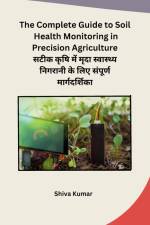von Shiva Kumar
30,00 €
Soil, the foundation of life, is an essential component of agricultural productivity. Healthy soil not only provides the nutrients that crops need to grow, but also filters clean water, purifies air, and stores carbon. Unfortunately, many factors are threatening soil health, leading to declines in crop yields, environmental degradation, and food security risks.What is Soil Health?Soil health can be defined as the ability of soil to function as a living ecosystem. It is a balanced combination of biological, chemical, and physical properties that are essential to supporting plants and animals, maintaining or improving water and air quality, and promoting the health of plants and animals.Healthy soil has the following characteristics:· Physical properties: Good structure, water holding capacity, and aeration· Chemical properties: Balanced levels of essential nutrients, neutral pH, and low salinity· Biological properties: Diverse and abundant soil organisms, high organic matter, and carbon storageHow Does Soil Health Affect Crop Production?Healthy soil is essential for high crop yields. It provides plants with the nutrients they need to grow strong and healthy. Healthy soil also helps to improve water infiltration and retention, which can help to reduce drought stress and improve crop resilience to climate change. Additionally, healthy soil supports a diverse population of soil organisms that help to break down organic matter and release nutrients to plants.Research has shown that healthy soil can lead to significant increases in crop yields. For example, one study found that a 10% increase in soil organic matter can lead to a 20% increase in crop yields.




